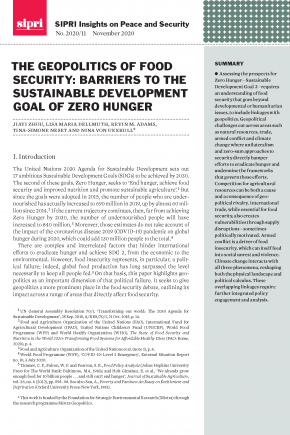The Geopolitics of Food Security: Barriers to the Sustainable Development Goal of Zero Hunger

Assessing the prospects for Zero Hunger—Sustainable Development Goal 2—requires an understanding of food security that goes beyond developmental or humanitarian issues, to include linkages with geopolitics. Geopolitical challenges cut across areas such as natural resources, trade, armed conflict and climate change where unilateralism and zero-sum approaches to security directly hamper efforts to eradicate hunger and undermine the frameworks that govern those efforts.
The report provides an overview of how geopolitics interacts with these areas. Competition for agricultural resources can be both a cause and a consequence of geopolitical rivalry. International trade, while essential for food security, also creates vulnerabilities through supply disruptions—sometimes politically motivated. Armed conflict is a driver of food insecurity, which can itself feed into social unrest and violence. Climate change interacts with all three phenomena, reshaping both the physical landscape and political calculus. These overlapping linkages require further integrated policy engagement and analysis.
I. Introduction
II. Between governance and geopolitics: Room for analysis
III. The competition for natural resources
IV. The necessity of trade
V. The interactions with armed conflict
VI. The impact of climate change
VII. Conclusions: Beyond the return of geopolitics

